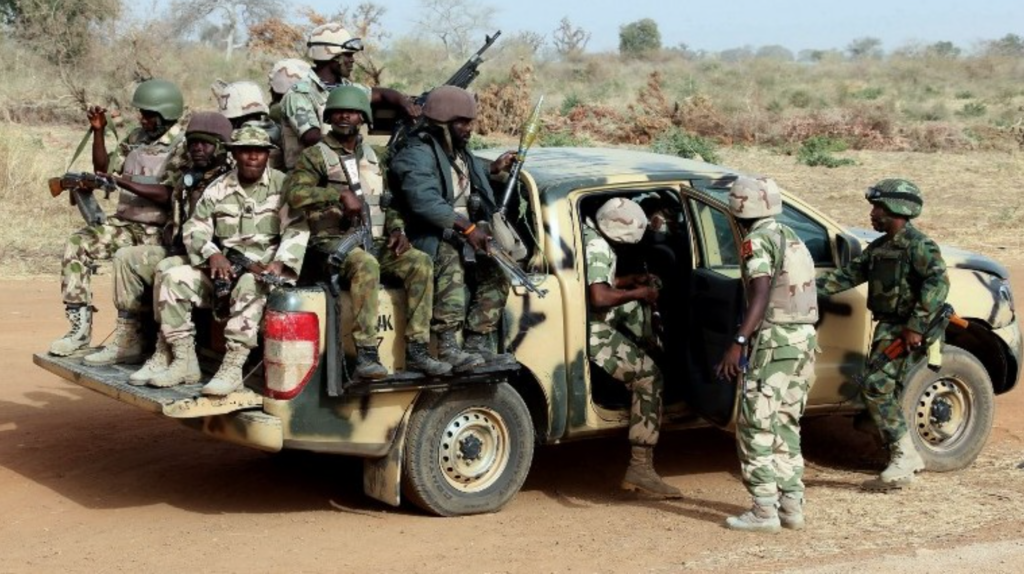AKURE, NIGERIA – The Nigerian Army announced last week that troops dealt a deadly blow to Islamic State of West African Province (ISWAP) fighters in Borno State.
Soldiers stormed Gudumbali after ISWAP elements declared the northeastern town their headquarters.
According to Nigerian military sources, the battle lasted around five hours, with ISWAP incurring “many casualties.”
Though the Nigerian Army hasn’t made further statements on the battle, a civilian source who witnessed the battle, Malam Lawal, told The Defense Post that ISWAP indeed suffered casualties. “Some broke their legs. Some their arms,” he said.
Gudumbali Battle
Announcing the January 25 battle, the Nigerian Army tweeted that troops of the 401 Special Forces Brigade and 19 Brigade Baga “neutralized terrorists and destroyed the purported ISWAP Caliphate” while on clearance operations between Cross Kauwa and Gudumbali.
A day later, troops of the 25 Task Force Brigade Damboa, Borno State, destroyed and burnt a Boko Haram/ISWAP night market at Gumsuri, not far from Gudumbali.
Three days later, on January 29, the army announced that troops of 120Bn, in conjunction with members of the Civilian Joint Task Force, “ambushed scores of terrorists” at Ngirbua village in Yobe State, neutralizing several terrorists and capturing their equipment.
The wins for the Nigerian Army come on the heels of Nigerian President Muhammadu Buhari’s repeated pledges to launch an onslaught against bandits in the North West and terrorists in the North East of Nigeria.
“We’re going to do our best, and the military and law enforcement agencies here have been given a clear order,” he said. “They shouldn’t spare any bandit or terrorist threatening the lives and properties of Nigerians. We are going to hand over a secure nation better than we inherited it.”
ISWAP’s Increasing Presence in Borno
ISWAP fighters made an incursion into Gudumbali earlier in the week, dislodging local chieftains and declaring the town its “Manhaja Jundun Khilafah Wylaya West Africa” (caliphate headquarters).
Gudumbali serves as headquarters of the Guzamali Local Government Area of Borno State, some 125 kilometers north of the state capital, so it is of strategic importance to the government.
ISWAP had previously established a market at Daban Gajere and another at Tamfalla in the Marte Local Government Area, which prompted an outcry from Borno State Governor Professor Babagana Zulum over the terrorists’ presence.
“ISWAP fighters are better armed, better equipped, more intelligent, and more sophisticated than Boko Haram, hence the need to pursue the ISWAP now,” he said on January 12.
Commending the federal government on its efforts so far, he also said he was deeply worried about the increasing presence of ISWAP in some parts of the state, especially in the south.
Moreover, after ISWAP fighters killed Boko Haram leader Abubakar Shekau in June, Boko Haram fighters defected to ISWAP, though the exact number isn’t known.
Significance of Gudumbali
At the peak of Boko Haram territorial conquest, Gudumbali became one of the strongest outposts of the insurgents near the Nigeria/Nigerien border.
The routes were heavily mined and fortified, and several army attempts to enter the area were unsuccessful.
In 2018, 144 officers and soldiers lost their lives in a single engagement trying to capture the town from insurgents. The army built a monument for the fallen soldiers there.
“Gaining victory at Gudumbali last week is important for the military,” said Professor Bayo Fasuwon of the Political Science Department at Adekunle Ajasin University, Akungba Akoko.
“It’s to show the Buhari administration that the military can handle the terrorists. As for Buhari, it will demonstrate that he is committed to defeating ISWAP and leaving Nigeria a better place for when he leaves office next year,” he explained to The Defense Post.
“In the case of ISWAP, it will dampen their morale because Gudumbali is strategic to their operations in the area.”
Gudumbali Victory
Though the army claimed victory at Gudumbali, residents of northern Borno told The Defense Post a sizeable number of ISWAP and Boko Haram fighters still lurk in the state’s northern fringes.
“We are happy the Nigerian government and soldiers for dealing with ISWAP, but we hear a number of ISWAP and Boko Haram fighters are in the northern part of the state,” said Bello Kura, a resident of the town.
“The reclaiming of Gudumbali signifies an end of ISWAP because it is one of the strongest bases of ISWAP and Boko Haram,” said Alhaji Baku, another resident.
The Gudumbali battle represents a source of encouragement for the Nigerian military, which in December killed ISWAP commander Abou Sufyan and others in a Tucano aircraft strike along the fringes of Lake Chad.
The Nigerian Army has continually said ISWAP and Boko Haram insurgents have largely been defeated, frequently downplaying their own losses. However, insurgents have proven the army wrong time and time again.
Whether the Gudumbali victory now proves the army’s superiority over the rebels remains to be seen.



